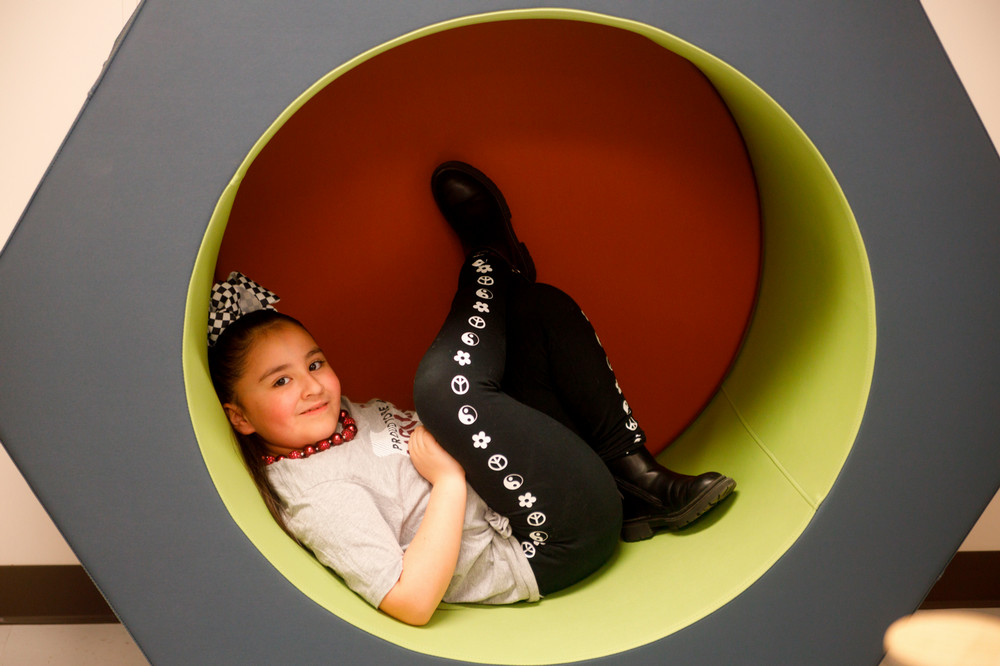Bianca Rawlings’ life was marked by both upheaval and opportunity shortly after she moved from Lockhart to New Braunfels in 2020. For years she had been in an abusive relationship with her husband and the father of her 7-year-old daughter. The move to New Braunfels was supposed to be a new start for the couple, but Rawlings ultimately ended the relationship. As she regained her confidence and independence, she also started planning for her future.
“I finally started making decisions for myself again, and one of those decisions was to go back to school to get a master’s degree,” said Rawlings, 30.
With a full-time job and a limited support system, it wasn’t easy, but she started pursuing her MBA at A&M-San Antonio. And now, the University is rolling out a new resource that will make it easier for the growing number of non-traditional students like Rawlings to further their education.
With the help of a $1.75 million Department of Education (DOE) grant, the University is unveiling a special program called Campus CARES that will help improve access to childcare in a part of the city where such resources are scarce. At the same time, the program will improve student retention and completion rates.
Campus CARES includes two childcare initiatives, both of which promote access and inclusion. The first, which opens in January, is for school-age children (4 to 12) and will operate from 3:45 p.m. to 8:45 p.m. The childcare service will be available free of charge to students who are Pell Grant eligible or are single parents. The modular space will accommodate 50 children at any one time, with 25 in each of the two classrooms.
The modular service will eventually move to the University’s Educare facility. Still in the early planning stages, plans call for a $19.7 million, 26,000-square-foot facility that will provide childcare for children (ages 6 weeks to 5 years) of students, staff and Bexar County residents during the day and extended day (afterschool) care for children ages 6 weeks to12 years. Costs for the service will be on a sliding scale, depending on whether the parents are students or qualify for financial aid. The DOE grant will contribute to part of Educare’s operating budget when it opens, but it does not contribute any capital funding. The University is currently raising funds for Educare, including through partnerships with Pre-K 4 SA, AVANCE and the United Way.
Dr. Melissa M. Jozwiak, an early childhood professor in the Department of Educator and Leadership Preparation, said South San Antonio is a childcare desert, where the number of available spots for quality childcare is approximately eight per 100 children.
“Many of our students have to bring their child with them to class or have them sit in the hallway,” said Jozwiak. “There is a huge need for childcare, especially nighttime care. Families are really struggling, and this (Campus CARES) will serve as an economic support system and a workforce solution four out students.”
Rawlings said having access to on-campus childcare is a great opportunity for her to take advantage of campus services like counseling and tutoring, and it will also free her up to pursue extra credit projects.
“I’m very big on contributing fully to a class,” she said. “Sometimes I feel a little bit envious of the other students who are at different stages in their lives and can easily plan their schedules and attend events. Having childcare would really help me to participate in more activities and grow my network.”
Dr. Catherine O’Brien, director of the Campus CARES afterschool program and an adjunct faculty member with The Department of Educator and Leadership Preparation, said the modular childcare center will support each child’s individual needs, including those with learning disabilities and second-language learners. Teachers will provide a project-based curriculum, with opportunities to explore and learn about outdoor spaces and engage in critical thinking.

“We’ve created a space that’s cozy where children’s brains and bodies will both be stimulated,” said O’Brien.
Moreover, the childcare facilities will also provide educational and training opportunities for student workers studying psychology and child development. “What better way to learn about motor development than watching kids on a playground,” said O’Brien. “This is really unique in that it’s a place that will have a direct link to academic classes and learning experiences, while simultaneously providing much-needed childcare.”
